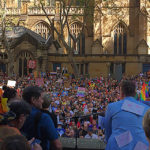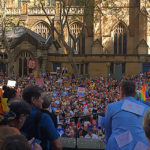Religious Privilege Set to be Enshrined into Law

Discrimination law experts assert that there’s a gap in Australian law when it comes to protecting those of faith, however the laws that the Morrison government has been prioritising – under two iterations of its Religious Discrimination Bill (RD Bill) – aren’t quite what they have in mind.
The laws that Pentecostal PM Scott Morrison has had in his sights since December 2017 – straight after the legalisation of marriage equality – are much more about providing Christians and others of faith with the privilege to act in a discriminatory manner if their religion suggests this behaviour.
Recently-minted attorney general Michaelia Cash told a 26 May Senate Estimates hearing that the religious legislation, which was placed on the backburner during the onset of the COVID-19 pandemic, was set for redrafting, with two initial rounds of public consultations having taken place.
Cash later told the Australian in mid-June that the next draft of the RD Bill will be released by December. And placing the divisive “religious freedoms” debate on the agenda for the coming election, also serves to placate conservative groups, like the Australian Christian Lobby.
An archaic agenda
While the religious freedoms debate was front and centre in August 2019, Anglican priest and social justice advocate Father Rod Bower told Sydney Criminal Lawyers that “there’s no evidence of any sort of widespread discrimination against people of faith”.
If there is any tangible evidence of prejudice targeting any distinct religion over recent years it would be the Islamic faith. And considering the focus those behind the laws, the Christian Right, have had during the debate, we can see that the protection of Muslims has never been a primary concern.
The prioritisation of religious freedoms commenced as conservative Coalition MPs of the Christian faith became threatened by the rising support for same-sex marriage, which they’d tried to guard against when Howard amended the Marriage Act 1961 (Cth) in 2004 to make it unlawful.
Footballer Israel Folau became a poster boy for the push for greater religious protections in law, when he was reprimanded by Ruby Australia after he repeatedly made homophobic remarks in public. It was this “right to be a bigot” agenda that the government was again aiming to protect.
And initial drafts of the RD Bill said it all.
One provision that raised concerns is the health practitioner conduct rule, which would permit a health professional to refuse a particular service to a patient if it doesn’t agree with their faith. Indeed, the patient’s treatment requirement is classed as a form of indirect discrimination.
Complacency will bite back
The Rationalist Society of Australia’s just released its Religiosity in Australia report, which reveals that the overwhelming majority of this nation considers the enshrining of these types of measures in law as unimportant.
And it seems that just like numerous other actions being taken by the Morrison government – think gas expansion and war with China – the push for these laws isn’t what most Australians want, rather it’s a government deaf to the wants of the people as it continues its own long-term agenda.
But the real clincher is, these laws that have been dressed up in fluffy rhetoric about protecting all, even the non-religious, will ultimately privilege the wants of conservative Christians above the discrimination protections that have been built up since the 1970s to protect women and minorities.







